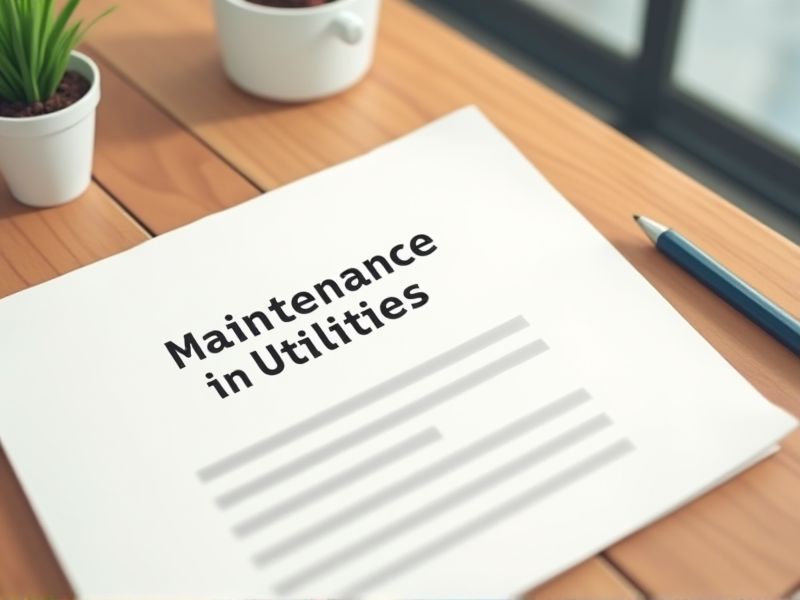
Maintenance Managers in utilities face complex machinery and stringent safety standards, necessitating a solid foundation of specialized knowledge. Certain certifications equip them with the skills to ensure operational efficiency, regulatory compliance, and preventive maintenance strategies. Such credentials validate their expertise in handling the challenges unique to utility operations. Here are some important certifications that may be required for a Maintenance Manager in Utilities.
Certified Maintenance & Reliability Professional (CMRP)
The CMRP certification ensures a Maintenance Manager possesses the standardized knowledge critical for improving utility operations efficiency. Managers with CMRP credentials often achieve reduced equipment downtime, enhancing reliability and service quality. This certification provides a competitive edge by validating expertise in industry best practices and asset management. Increased regulatory compliance and safety measures are more effectively managed with the specialized skills gained from CMRP training.
Project Management Professional (PMP)
A Maintenance Manager in Utilities benefits from Project Management Professional (PMP) certification by effectively managing complex maintenance projects, leading to improved efficiency and cost reduction. PMP credentials ensure that the manager can implement standardized project management methodologies, enhancing project delivery timelines and compliance with regulatory standards. Applying PMP principles aids in resource optimization and risk management, which is crucial in maintaining utility infrastructure. The certification also enhances communication skills, facilitating better coordination between different teams and stakeholders.
OSHA 30-Hour Training Certification
The OSHA 30-Hour Training Certification equips a Maintenance Manager in Utilities with comprehensive knowledge of safety standards, reducing workplace accidents. Understanding these regulations ensures safer supervision of tasks involving hazardous materials or high-risk operations. Certification fosters a culture of safety within the team, enhancing overall productivity and reducing downtime. Having certified managers can also mitigate compliance-related fines or legal issues for the organization.
Certified Energy Manager (CEM)
Certified Energy Manager (CEM) provides expertise in optimizing energy efficiency, leading to reduced operational costs in utilities. As energy comes at a premium, a Maintenance Manager equipped with CEM skills can better identify inefficiencies and implement corrective measures. This certification also ensures compliance with regulatory standards, preventing potential fines and legal issues. With a focus on sustainable practices, CEMs drive environmental responsibility, enhancing the company's reputation.
Six Sigma Green Belt Certification
Six Sigma Green Belt Certification equips a Maintenance Manager with statistical analysis skills, leading to increased efficiency in utility processes. Possessing this certification often results in reduced operational costs due to better process optimizations. With a focus on quality management, certified managers can more effectively minimize equipment downtime. This specialized knowledge contributes to more reliable service delivery in utility operations.
Lean Management Certification
Lean Management Certification equips a Maintenance Manager in utilities with tools to streamline processes, which can lead to reduced downtime and increased operational efficiency. By understanding lean principles, the manager can effectively identify and eliminate waste, resulting in cost savings and improved system reliability. This certification fosters a culture of continuous improvement, enhancing team collaboration and problem-solving skills. Utilities face ever-evolving regulatory and customer demands, and lean management helps maintain competitiveness and compliance by optimizing resource utilization.
Certified Facility Manager (CFM)
Certified Facility Managers have extensive knowledge of best practices, which can optimize maintenance protocols in utilities. Their expertise can lead to improved efficiency, reducing downtime and operational costs. Certification also ensures compliance with industry standards and regulations, minimizing risks. CFM holders possess leadership skills that aid in managing diverse maintenance teams effectively.
Certified Reliability Engineer (CRE)
A Certified Reliability Engineer (CRE) improves asset reliability, reducing downtime and maintenance costs, which directly impacts utility company efficiency. They apply data-driven methods to predict failures, allowing maintenance managers to proactively schedule repairs. With expertise in risk assessment, CREs help utilities minimize operational risks that can lead to service disruptions. Their skills in failure analysis strengthen the maintenance team's ability to implement long-term reliability improvements, enhancing overall service quality.
NFPA 70E Electrical Safety Certification
NFPA 70E Electrical Safety Certification ensures that a Maintenance Manager in Utilities is knowledgeable about the latest safety standards, which decreases workplace electrical hazards. This certification aligns with OSHA regulations, thereby reducing the likelihood of legal and financial repercussions for the company. A certified manager can effectively implement safety protocols, which contributes to minimizing downtime due to accidents or incidents. Certification fosters a culture of safety within the organization, leading to improved morale and higher productivity among team members.
ISA Certified Control Systems Technician (CCST)
A Maintenance Manager in utilities requires an ISA Certified Control Systems Technician (CCST) to ensure accurate and efficient control system operations, minimizing downtime and optimizing resource use. CCSTs bring specialized knowledge of instrumentation and control systems, crucial for maintaining consistent utility services. They are equipped to troubleshoot complex issues swiftly, reducing maintenance costs and enhancing system reliability. With their certification, CCSTs uphold industry standards, ensuring compliance and safety within utility operations.
Summary
When you, as a Maintenance Manager in Utilities, obtain certifications, your expertise will likely be validated, enhancing your credibility. This can lead to increased efficiency in managing utility systems and optimizing resource allocation. The certification might also open up new career advancement opportunities, potentially leading to higher job satisfaction. Your team's performance could improve as well, given the updated knowledge and practices you bring to the table.
